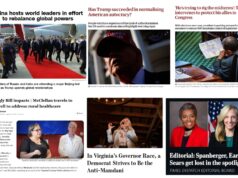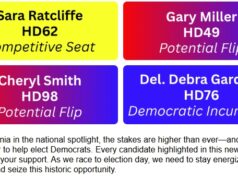Yesterday, far-right-extremist/loony-tunes Rep. Bob Good (R-VA05) was ranting and raving – as he’s wont to do! – about how “we should not fear a government shutdown,” because supposedly “most of what we do up here is bad anyway…hurts the American people…most of the American people won’t even miss if the government is shut down temporarily.”
In fact, the VAST majority of what the government does is not only NOT bad, it’s very GOOD, important stuff that the vast majority of Americans depend upon and support — Social Security, Medicare and other healthcare expenses, Military/defense/national security, Veterans benefits/care, Education, Transportation, Environmental protection/NOAA/etc., Clean energy R&D. Or, as Rep. Gerry Connolly (D-VA11) tweeted yesterday:
“During a government shutdown: The FHA can’t process loans and mortgage approvals. The FDA can’t conduct food safety inspections. The SBA can’t process loans to help start small businesses. The EPA can’t inspect drinking water systems and chemical facilities.”
Also note:
Shutdowns also carry a cost to the economy. The Congressional Budget Office (CBO) estimated that the 2018-2019 shutdown reduced Gross Domestic Product (GDP) by a total of $11 billion, including $3 billion that will never be recovered. On top of that effect, CBO notes that longer shutdowns negatively affect private-sector investment and hiring decisions as businesses cannot obtain federal permits and certifications, or access federal loans. A 2019 Senate report found that the three government shutdowns in 2013, 2018, and 2019 cost taxpayers nearly $4 billion.
So yes, we SHOULD “fear a government shutdown” for the adverse impact it would have on our country.
As for Virginia, of course we have many federal civilian employees, plus numerous government contractors, military members, as well as federal government annuitants. As this 2018 post by GMU’s Stephen Fuller Institute found:
During a shutdown, the federal government stops contributing to key components of the Washington region’s economy, including civilian and military wages and salaries, procurement and grants. Altogether, the federal government accounts for 29.9 percent of the regional economy and pays $2.5 billion each week for work being performed in the region. During the shutdown, a significant portion of this activity will stop.
The economic impact, of course, depends heavily on how broad a shutdown is and how long it lasts. But regardless, government shutdowns are not good things economically speaking, or in almost any other way.
Of course, there also could be POLITICAL repercussions from a government shutdown, and those could be good or bad, depending on your perspective. For instance, in 2013, there was a government shutdown that lasted from October 1 through October 17, ending just 19 days before Virginia’s 2013 elections for Governor, Lt. Governor, Attorney General and House of Delegates. How did this impact the election results? It’s hard to say, exactly, because the minute the shutdown ended, attention turned to the botched rollout of the healthcare.gov website, because the news media (and public attention) rapidly moved on, and because there wasn’t really any early voting back then (just 121k out of 2.25 million…about 5%; compared to 1.2 million early votes in 2021 out of 3.28 million votes cast…about 36%). Let’s look at the polling before, during and after the government shutdown – as well as the final results of the election – to see what impact it might have had.
- September polling: Terry McAuliffe led Ken Cuccinelli in all thirteen September polls, with McAuliffe holding an average lead of about 5 points.
- October 1-17 polling: During the government shutdown, Terry McAuliffe led Ken Cuccinelli in every poll, by an average of about 8 points…up about 3 points from McAuliffe’s September average lead.
- October 18-November 5 polling: After the government shutdown, Terry McAuliffe led Ken Cuccinell in in every poll, by an average of about 8.5 points…very similar to the October 1-17 polling average, and still up a few points from the September polling average By the way, note that the final polls prior to the election had McAuliffe up 12 points (Newsmax, which is right wing), 7 points (Public Policy Polling, which is pro-Democratic), 6-7 points (Quinnipiac, which is neutral)…so no sign of McAuliffe falling off in any of those polls just prior to the election. It’s worth noting that one poll, Emerson College, conducted from October 25 to October 30, had McAuliffe up just 2 points.
- Actual results: Despite all these polls predicting an easy (8-point or so) win for McAuliffe, the actual results were SUPER close, with McAuliffe somehow only managing to narrowly defeat Cuccinelli, 47.75%-45.23%, a 2.5-point win for McAuliffe…about 6 points below the October 18-November 5 polling average.
So…what this polling shows is that, contrary to the conventional wisdom, there’s no real sign that the government shutdown boosted McAuliffe’s standing, nor is there any real indication that the end of the government shutdown hurt McAuliffe’s standing. And yet, somehow, despite leading in the polls by about 8 points during October and early November, McAuliffe ended up winning the election by only a narrow 2 points over an extreme-right-wing candidate. WTF?
Which brings us to possible lessons or indications for potential impact of a Republican-caused federal government shutdown on the 2023 Virginia elections. And the answer is…who the hell knows? Or maybe a better answer is that, based on 2013 polling and final results, there’s not much indication that the shutdown made much (any?) difference in the end. Although perhaps the fact that the shutdown ended several weeks prior to election day, and that attention turned to other things (specifically, the botched rollout of the healthcare.gov website), MAY have made a difference on election day itself, despite the polls not really reflecting or predicting that?
Bottom line: The conventional wisdom is that a Republican-caused government shutdown would be bad for the country, but potentially could help Democrats in this fall’s Virginia elections, but…maybe that’s not actually the case? What do you think? Maybe people just blame “both sides,” even when it’s 100% extremist Republicans’ fault, because that’s how the #@$!&^* media reports things?
P.S. A smart Virginia politico suggested to me that maybe what happened was Democratic voters weren’t excited to show up in that election. That certainly could be the case, although many of the polls were of “likely voters,” which means they theoretically took enthusiasm (or lack of enthusiasm) levels into account.














